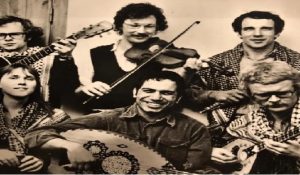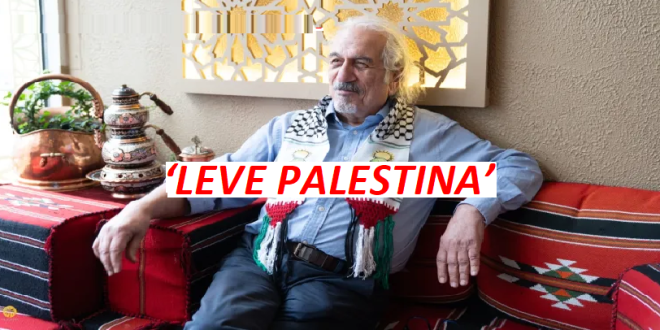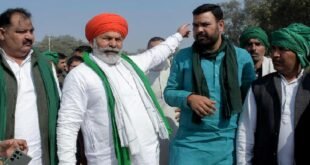13-08-2024
GOTHENBURG, SWEDEN: George Totari’s understated apartment is full of noise and life even in his retirement, as he sits surrounded by his daughter and grandchildren. Soft grey walls typical of a Swedish apartment bear no hallmarks of a home belonging to an internationally acclaimed musician, however.
 With his long, greying hair, wide-rimmed spectacles and fiery eyes, the Swedish-Palestinian Christian, born in 1946 in Nazareth, remembers his hometown being transformed by illegal Israeli settlements and checkpoints when he was a child.
With his long, greying hair, wide-rimmed spectacles and fiery eyes, the Swedish-Palestinian Christian, born in 1946 in Nazareth, remembers his hometown being transformed by illegal Israeli settlements and checkpoints when he was a child.
By the 1960s, Nazareth had become a hotbed of Palestinian activists amid a swelling number of internally displaced people. And its vibrant interfaith community of Palestinian Christians and Muslims, together with their political zeal, were the inspiration for a powerful protest song by Totari, first released in Northern Europe in the late 1970s and revived, decades later, by the latest global movement against the ongoing war on Gaza.
Leve Palestina, Totari’s 1979 song about Palestine, has gained new life since Israel’s brutal war on Gaza began on October 7 last year and has left more than 39,000 Palestinians dead with many thousands more lost under the rubble and presumed dead and nearly 90,000 wounded.
On a grey, late October rainy day in Stockholm, protesters against the war gathered in the Swedish capital chanting the lyrics to Totari’s song from the 1970s, calling for an end to Israel’s bombing of Gaza:
“Leve palestina och krossa sionismen. Leve leve leve Palestina… (Long live Palestine and crush Zionism. Long live, long live Palestine…)”
A video of the protest, clipped together with the song, Leve Palestina, itself and uploaded on TikTok, immediately went viral and reached more than five million views since October. The comments section overflowed with supporters hailing from Afghanistan, Pakistan and Turkey expressing their newfound fondness for Sweden’s Palestinian song.
Since then, Leve Palestina has become the go-to resistance anthem on the streets in Sweden and social media videos.
 In April, pro-Palestine activists on the Stockholm Metro in Sweden sang Leve Palestina. In a video of that protest, the camera moves across multiple carriages full of keffiyeh-wearing Swedes, cementing Totari’s song as an anthem for Palestinian resistance around the world.
In April, pro-Palestine activists on the Stockholm Metro in Sweden sang Leve Palestina. In a video of that protest, the camera moves across multiple carriages full of keffiyeh-wearing Swedes, cementing Totari’s song as an anthem for Palestinian resistance around the world.
It all started in 1972, with the emergence of a counterculture band called Kofia which consisted of five mainstay artists Totari, Palestinian percussionist Michel Kreitem whose family fled Jerusalem in 1948, and the Swedish trio of Carina Olsson, singer, Bengt Carlsson who played the flute and Mats Ludalv who played the guitar, mandolin and oud.
An ever-changing group of Palestinian drummers and choir joined them, spearheaded by Olsson, who joined the band after jumping on stage during a performance, and Totari, the band’s songwriter, vocalist and also an oud player.
The band’s name refers to the similar-sounding keffiyeh, a scarf commonly worn in Palestine and known for its woven patterns and its symbolism of resistance.
Kofia played music at demonstrations opposing the Vietnam War and South African apartheid during the 1970s. At that time, Gothenburg, traditionally a working-class city, was central for activists supporting international solidarity movements that included demonstrations against South African apartheid and the Vietnam War.
The band was particularly popular within the left-leaning, alternative music crowd that vigorously lived and breathed socialism and anti-imperialism in 1970s Sweden. (Int’l Monitoring Desk)
 Pressmediaofindia
Pressmediaofindia




